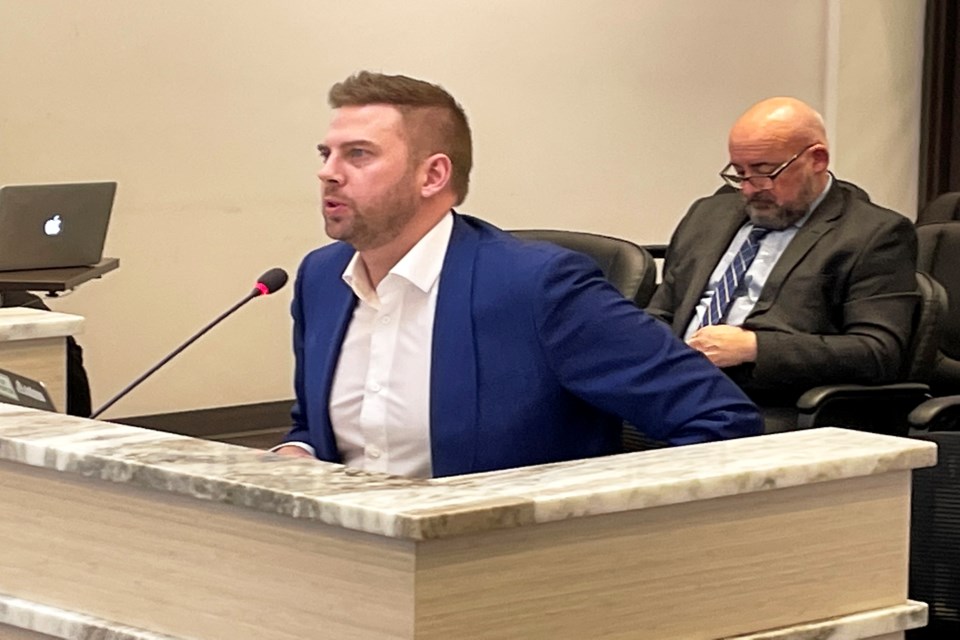INNISFAIL – Town council has unanimously approved sending a letter of support for Varme Energy’s ambitious waste-to-energy mega-project for Innisfail to deputy prime minister Chrystia Freeland.
However, the letter, which was brought to town council by mayor Jean Barclay on March 13, is more than just seeking a standard well-wishing endorsement for the $200-million project, which features a game-changing waste-to-energy plant in Innisfail.
The town also wants Freeland, who is also the federal minister of finance, to back Varme’s plan to secure a new carbon contract for differences (CCFD), a critically important investment offering that is part of the new $15-billion Canada Growth Fund (CGF) that was announced in the 2022 federal budget, and more specifically with a technical backgrounder in the Fall Economic Statement.
The new CCFD is a risk guarantee for investors against uncertainty around future carbon prices or the price of carbon credits, especially in the event of a federal government regime change or wholesale policy makeovers when a new government is formed.
With millions of dollars of investment money at stake, and future carbon capture revenues potentially threatened with federal government changes, Sean Collins, chief executive officer of Varme, has been knocking on the doors of top-level federal government officials for the past six months.
“We would like the federal government to provide a carbon contract for differences to the Innisfail waste energy project. That would be our ask of the federal government,” said Collins, whose Edmonton-based company is a Canadian subsidiary of Norway-based Green Transition Holdings.
He said he’s met with Randy Boissonnault, associate minister of finance, and his staff in Edmonton, and has had contact with the deputy prime minister’s staff.
“They have invited us to continue along the process,” said Collins, adding early talks have been “generally receptive.”
Collins emphasized the biggest risk to most climate-oriented financial models is around carbon pricing.
“Investors are sensitive to the risk. If a government changes, if there's a price change; some of those revenue streams could go away,” he said. “Essentially the federal government is offering a backstop to that, saying that in the event of a change in the pricing scheme in Canada you still have a valid backstop to the price of carbon.
“If for some reason there is a change in the price the government makes up that difference; kind of as a risk guarantee that if you're making an investment based on federal rules and the rules change, your project isn’t hurt by that,” added Collins. “It's essentially just a risk swap between the project and the federal government on the price of carbon in the event the price of carbon changes.
“They eat that risk. They have to then cover that cost.”
As well, securing a CCFD while on the hunt for future investment will undoubtedly grab the attention of top lending institutions much easier and faster.
“If you can get a carbon contract for differences for the project, you're significantly more bankable,” said Collins. “You're significantly more likely to raise financing and faster because you now have one of your primary revenue streams secure.
“It’s a lower risk project. That’s the biggest thing,” he added. “Once you have more confidence from bankers, it's more confidence from constructors, and it just generally helps add confidence to the project; you get better people and high-level focus.”
Collins said for project development purposes he hopes to have the CCFD secured as quickly as possible but realistically the right answer he’s looking for may not come until much later this year.
“The quicker you get that the faster every banker wakes up and is like, ‘ok, cool. This is a hot project,” said Collins, whose company could be the first in the country to land a CCFD under the CGF program. “But realistically our sense is this will take into spring and summer. Governments never move too fast.”
But governments generally do stick to their agendas and ideology.
With a hotly contested federal election expected to take place in 2025, and the opposition Conservative Party of Canada already polling high numbers, a regime change is a possibility.
Is there any preliminary worry then from Varme that a secured CCFD would at the very least be challenged?
“The federal government doesn’t sue its own projects. You never go backwards,” said Collins. “This is a way for the Liberal government to make their mark on history, like now all these projects will for sure get built.
“And even if there's a regime change afterwards, they'll always credit the Liberal government for having initiated them,” he added.
“You are sort of insulated from a regime change but you’re also sort of directly giving the kudos to the government that backstopped them to get them started.”



